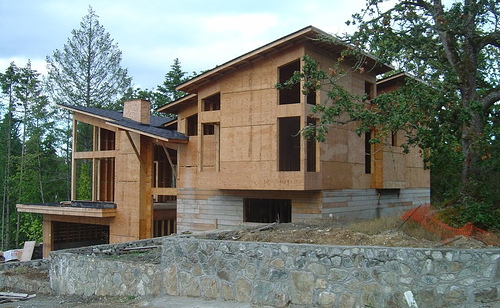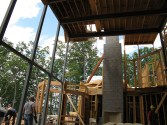March 15, 2017
Should Homeowners Bring Complaints Against Contractors Before Courts or Regulators?
Property owners frequently have complaints about construction contractors. Some of these complaints involve thousands of dollars in damage or serious infringement upon the use or value of property. These property owners (and their attorneys) want to know who to turn to. Should homeowners bring complaints against contractors before courts or regulators? This question raises issues about how the government ought to enforce its laws and resolve disputes. There is a perspective that regulatory boards ought to be a welcome forum for owners threatened or damaged by alleged contractor misconduct. In this blog post I will explain why I believe that, for all its imperfections, the judicial system is the best venue for vindication of legal rights in consumer disputes.
In 2015, the Court of Appeals of Virginia decided an illustrative case arising out of a complaint of a home purchaser about the seller’s contractor. Around 2002, Mark Holmes purchased an Alexandria, Virginia home, including an addition constructed by Culver Design Build, Inc. Mr. Holmes was unhappy about defective construction of the addition. He went to the city government, whom the General Assembly tasked with enforcing the building code in his locality. The City Code Administration found extensive water damage caused by construction defects and issued a Notice of Violation to Culver. Holmes was not satisfied with Culver regarding corrective work, so he filed a complaint with the Virginia State Board of Contractors. Holmes asked the Board to suspend Culver’s license until it corrected the violation. Culver Design Build, Inc. argued that Holmes did not have legal standing to seek judicial review of the Board’s ruling because this was a license disciplinary proceeding. The Holmes case also includes issues about how deferential the courts should be to a licensing agency’s administrative rulings. This case is unusual in that Mark Holmes represented himself in his appeal to the Court of Appeals of Virginia. Mr. Holmes acknowledged that unlike the seller, he lacked the privity of contract with the contractor which potentially could be used to go to court in breach of contract. The Court of Appeals agreed with Culver and the Board for Contractors.
When homeowners conclude that a state-licensed contractor or tradesperson committed a wrongful act depriving them of their home or damaging its value, it is easy to see why the aggrieved party would want a governmental agency to help them. Most people deal with governmental agencies much more than courthouses or law offices. Lawsuits require significant commitments to pursue or defend. Public resources go to supporting various agencies that have apparent subject-matter authority. This may appear to be a taxpayer-financed legal authority to go after the professional. However, this strategy often does little more than aggravate the licensed professional, the agency officials and the consumer. The Holmes v. Culver case illustrates one key weakness with homeowners pursuing consumer complaints through the professional licensure and disciplinary board process.
When consumers are harmed by unprofessional conduct, usually what they want is to have the defect corrected, an award of money or the transaction voided. These kinds of remedies are conventionally handled in the court system. The professional regulatory boards focus on licensure. They consider whether a business is properly licensed, should the license be suspended or revoked, should fines be assessed, and so on. Prominent members of the industry typically dominate these boards. For example, licensed contractors sit on the Board for Contractors. Initiating a professional licensure proceeding is a clumsy means of advancing the specific interests of the consumer having a transactional relationship with the business. It is the judiciary that can grant money damages or other remedies arising out of the formation and any breach of the contract. Regulators focus on whether disciplinary action is warranted regarding the registration or licensure of the business. In the Culver Design Build, Inc. case, the Board for Contractors and the Court of Appeals for Virginia agreed that Mark Holmes did not have standing to contest a regulatory decision in favor of the contractor. The board had authority to punish Culver for failing to abate a regulatory violation. However, the board had no authority to order the contractor to take any specific action at the job site. The board did not deny Homes any right or impose upon him any duty in its decision, because its authority revolves around Culver’s licensure. It is the State Building Code Technical Review Board that has the authority to review appeals of local building code enforcement decisions, not the Board of Contractors. One of the appeals judges suggested that if Holmes’ contentions were taken to a logical conclusion, the new buyer of the house could have greater leverage over a contractor than the previous owner, whose remedies may be limited by the contract. In his oral argument, Mark Holmes admitted that trying to resolve his complaints through the Board of Contractors complaint process was, “cumbersome and very long lasting.”
Even if the consumer unhappy with an adverse decision made by a regulatory agency in response to a complaint has standing, her appeal to the courts may encounter other obstacles. The licensure dispute is unlikely to starts afresh on appeal. The courts tend to be receptive to the agency’s interpretation of the legislature’s statutes. In Virginia, courts accord deference to an agency’s reasonable interpretation of its own regulations (as adopted by the board pursuant to the statutes). A consumer’s ability to raise new factual issues may be strictly limited in her attempts to get the courts to overturn the board’s decision. Judicial deference to agency rulemaking is not without controversy. Judge Neil Gorsuch, whom President Trump nominated for the U.S. Supreme Court is a high-profile critic of judicial deference to agencies. In his August 23, 2016 concurrence to a federal appeals decision Gutierrez-Brizuela v. Lynch, Judge Gorsuch explained that concentration of both legislative and judicial power in regulatory agencies creates constitutional problems. The constitution protects the public from authoritarianism by separating the government by the type of power, not the subject-matter. Under the constitution, the legislature prescribes new laws of general applicability. Taken to its logical conclusion, doctrine that courts should defer to agencies’ quasi-judicial determinations of what the statutes mean unconstitutionally undercuts the independence of the judiciary. The constitutional problems identified by Judge Gorsuch are illustrated in the arena of housing industry occupational regulation.
Where does this leave an owner when property rights are infringed by regulated professionals? Should everyone should go back to renting? Certainly not! This is what the independent judiciary is there for. Usually owners have privity of contract with the contractor and do not need to go to an agency. They can sue for remedies for breach of contract or deceptive practices. Consumer advocates with an interest in legislation should focus on increasing access to the court system and not promoting an administrative process that may not be a good fit for the homeowner. If you find yourself needing to bring or defend a construction claim, contact my office or a qualified attorney in your jurisdiction.
Case Citations:
Homes v. Culver Design Build, Inc., No. 2091-13-4 (Va. Ct. App. Jan. 27, 2015) (Alston, J.)
HOMES V. CULVER DESIGN BUILD, INC. APPELLATE ORAL ARGUMENT
Gutierrez-Brizuela v. Lynch, No. 14-9585 (U.S. Ct. App. 10th Cir. Aug. 23, 2016) (Gorsuch, J.)
Photo Credit:
ehpien Old Town Alexandria via photopin (license)
October 14, 2015
Common Misconceptions about Home Builder Warranties
Home buyers want assurances that someone will correct defects in construction to make it conform to what they bargained for. In the sale of new homes, these assurances usually come in the form of the builder’s warranties. Homeowners must make serious decisions about whether to go under contract, go through with closing and allow a year or so to go by without making a warranty claim. The purpose of this blog post is to identify some of the top misconceptions buyers have about home builder warranties that interfere with good decision-making.
- “My Warranty Coverage is Only Shown in the Packet of Contract Documents.” In fact, warranties can also arise out of legislation or court decision precedents. Warranty law is a solution to the problem that a buyer can inspect something, pay for it and later discover that the construction was materially defective. In Virginia, the courts traditionally ruled that in every contract with a builder there is an implied warranty of good workmanship unless the terms of the contract provided specific disclaimers or modifications. This rule helped consumers by requiring that the contractor would have to stand behind their work unless there was some fine print otherwise. Builders responded by having their attorneys write-up those warranty documents that can range from a paragraph to over 50 pages. The Virginia General Assembly observed that contractors were finding ways to get buyers through real estate closings on properties that did not conform to contracts in spite of the efforts of local building code enforcement officials and the buyer’s inspections. They passed legislation that creates implied warranties of quality workmanship that arise in the sale of each new home construction. Unfortunately, both contractors and homeowners are often unaware of these statutory warranties and their relationship with the written contract documents including the written limited warranties. Homeowners find it much easier to negotiate with their builder if they know the full extent of their warranty rights from review of the agreements and statutes.
- “My Neighbor Couldn’t Make Use out of Her Warranty, So I’m Also Out of Luck.” Tragically, many homeowners allow their warranty rights to expire without preserving their right to exercise them. Builders, neighbors, building code officials and inspectors can give useless or misleading legal advice. Because the contract documents vary builder-to-builder and the implied warranty laws vary by state, it is impossible to give a general summary that can be applied in every case. Understanding warranty coverage requires compiling the contract and warranty paperwork and state statutes. Usually, the basic warranty lasts for only one year.
- “My Builder is the Best Person to Ask about what they are Required to Fix.” Builders know that the courts will not expect them to continue making warranty repairs to one house for as long as they continue to be in business. To the extent a builder is still working on a house they have already sold, they aren’t making any new money. Contractors sometimes use written warranty paperwork to confuse or limit the buyer’s warranty rights at the time of sale. The builder’s warranty too often is used as a sales tactic to assuage nervous buyers concerned about construction defects. If the homeowner complains to the builder about construction defects after move-in, some contractors try to keep them occupied with inspections and ineffectual repairs. If the builder’s employees are frequently at the house, the owner probably won’t invite independent inspectors, experts or other contractors who might diagnose serious warranty claims and help the owner protect their rights. Once the owner starts to lose confidence in the builder or the warranty period is approaching, the owner needs the help of independent experts.
- “The Only Construction Defects Worth Focusing on are the Ones I Look at Everyday.” Homeowners frequently focus on the types of construction defects that they notice everyday. Defects in drywall, painting, grout, trim and other finish work can add up to thousands of dollars in repair costs, but they may not be the most substantial defects made by the builder. Water may be leaking into the house. Major systems such as roofing, plumbing, electrical, HVAC, etc. may require extensive repairs or replacement if not properly addressed during a warranty period. In order to properly diagnose these problems, the owner must coordinate investigation with inspectors, experts or other contractors who are independent from their builder. Every homeowner owes it to themselves to know the truth about the condition of their house.
- My Realtor, Mortgage Broker, Settlement Agent or Builder Recommended This Home Inspector, so they must be fine.” In hiring a third party inspector to help with a home purchase, the independence of the home inspector is just as important as their competence. Most professionals in a real estate transaction are only paid when the deal goes to closing. If a home inspector or other participant does find a defect that would cause a deal to not go through or be substantially delayed, the other professionals won’t want them to be involved in the next sale. Most home inspectors know enough about houses to provide a report that is a great help to the buyer. What’s important to the buyer is having an inspector who isn’t allied with the people being paid out of settlement. That way, the buyer knows he is working for her.
A homeowner should not rely solely on the contractor to clarify what their warranty rights are. It’s better to find out from qualified inspectors, engineers or other contractors what, if anything is wrong with your house. A qualified attorney can help determine whether those defects are legally covered before time runs out. If the closing on the new home was less than 12 months ago, there is a strong chance the owner may be entitled to repairs or financial compensation from the builder for failure to make the house conform to the warranty.
Legal Authority:
Va. Code § 55-70.1. Implied Warranties on New Homes.
Mann v. Clowser, 190 Va. 887, 59 S.E.2d 78 (1950)
Photo Credit:
Northwest Modernism via photopin (license)(provided to illustrate home construction – not known whether depicted property has any construction defects)
December 9, 2014
Resolutions for Homeowners Dealing with Construction Defects
A good home provides a safe, comfortable and enjoyable place to live. When a contractor makes mistakes in construction, renovation or repair, the owner or tenant has to live with those defects every day until the problem is resolved. The coming New Year is a good time for homeowners to prioritize addressing contractor defects. In 2015, devise a strategy for relief from construction defects and feel love for your home again.
The key to efficiently realizing a goal is outlining the steps needed to realize it. This gives the owner a “to-do” list that can be tackled step-by-step over time. This may include a warranty claim against the contractor. Many contractors stand by their work and will honor well-founded warranty claims. It’s difficult to build a business from a base of disgruntled former customers. With some contractors, legal assistance may be necessary to obtain relief under a warranty. No two construction defect cases are the same. In each case, the contracts, warranties, physical conditions and defects are different. However, there are strategies that can make the process easier for the homeowner. The following are 7 New Year’s resolutions for homeowners dealing with construction defects:
- Investigate Defects Fully: Examine and photograph the physical appearance of the defects. Obtain copies of the manufacturer’s installation instructions. Research online reviews or other information about the materials used. Wise homeowners focus first on any safety or health concerns. In some cases, taking temporary action to limit future damage may be necessary. Discovering the truth about the defect is a solid foundation for dealing with it.
- Organize Warranty Information. The contractor likely provided contracts, correspondence, warranties and invoices. Usually installers do not warranty the materials used. The warranties for materials may have been provided in the packaging or available from the manufacturer. These items must be reviewed together and can become easily misplaced if not organized.
- Consult Regarding Implied Warranties. Many homeowners are not aware that a written set of terms is not the only way that products and installation may be covered by a warranty. In Virginia, there are certain contractor warranties that arise under operation of law. Consult with a qualified attorney about how coverage may arise under implied or written warranties. Unfortunately, warranties are easily waived if claims are not timely pursued.
- Consult Regarding Obtaining Expert Reports About Defects. In order to fix the defect, ultimately a qualified person will need to do further work on the house. To prove a warranty claim in court, the owner may need an expert witness to testify regarding the breach of duties or the proper figure of damages. Depending on the needs of the case, that expert may be a home inspector, licensed contractor, engineer, tradesperson or professional estimator. Hiring an expert to provide assistance in a lawsuit, reports or court testimony is not like hiring a professional to work on the house. If an expert is being engaged to provide legal support or trial testimony, the owner’s lawyer is the proper representative to work directly with the expert. One of the most important characteristics in retaining an expert in these types of cases is independence. A homeowner is not well served by an inspector or other contractor who will not be able to testify against the interests of the contractor who committed the defects. It’s best to go completely outside of the referral network of the builder.
- Consider Goals for the Property. When a dispute with a contractor erupts, sometimes even smart homeowners may struggle to maintain focus on how the project fits in to their goals for maintaining and developing the property. The homeowner may need to adjust their goals to fit new circumstances.
- Preserve Copies of Contractor’s Representations: If the contractor used intentional concealment, fraud or misrepresentation in the course of selling his services, the owner may have a claim for enhanced damages. Fraud cases are very difficult to prove, and the facts of most cases don’t support them. However, sometimes misrepresentations can be found in e-mail, text message or social media communications. Savvy owners take care to preserve any electronic communications with the contractor’s representatives.
- Consult with Counsel About Pursuing Claims. Once the case has been properly investigated with the assistance of legal counsel, the homeowner is in the best position to go back to the contractor about the warranty claim and, if necessary, pursue a legal remedy.
Whether a homeowner’s best interests lie in simply fixing the problem on their own or pursuing a legal claim against the contractor depends upon the unique circumstances of the case. Homeowners have the benefit of control over the property where key evidence may be preserved. The New Year is a good time for families to take necessary action to protect their physical, financial and legal aspects of home ownership.
photo credit: ungard via photopin cc (I am not aware of any defects with the house depicted in this photo, which was chosen for its seasonal characteristics)
December 27, 2013
Client Relationships for the Custom Home Builder in 2014
In the past year or so, demand outpaced supply in the Northern Virginia real estate market. Many home builders and tradesmen went out of business in 2008-2009, creating a shortage of home builders. For home buyers, a custom home offers the prospect of owning a made-to-order dream home. For the builder, the custom home business brings rewards as well. These include the pricing of a premium product and working closely with buyers to help them fulfill their dreams. These dreams bear the legal complexity of contracting for the sale of something that does not yet exist. For the buyer, this is the biggest consumer purchase of their life. They rightly take pride of ownership in the project. This blog post identifies a few key issues from the perspective of the custom builder for the New Year:
- Liability Shield. You stand behind your work and want to keep your customers happy. This is how business grows. At the same time, you owe it to yourself and your family to protect your personal assets and credit. Customers expect that they will be doing business with a company. By incorporating or forming an LLC prior to making contracts, custom builders can exercise reasonable control of the exposure of their own credit and assets. Communications and agreements with customers should clarify the seller’s identity.
- Choosing the Customer. Prospective customers are likely talking to other builders or realtors. If a prospect reminds you too much of a previous problem customer, she may not be a good fit for your business. The wrong customer may distract you away from your more deserving customers and prospects. Consult with legal counsel if anti-discrimination or fair credit laws may apply.
- Written Agreements. Use an attorney-prepared written contract prepared for the particular type of project and state law. It may not be necessary to have a “new” form for each job. However, a realtor form for the sale of homes in Maryland won’t work well for a custom home in Virginia.
- Customer Service. Always have someone available to handle customer inquiries, at least during normal business hours. Buyers of custom homes tend to visit the site frequently and have questions. They feel a tremendous amount of financial and emotional investment in the project.
- Project Control. Don’t allow the consumer to directly supervise your subcontractors on the job site. An excited buyer may want to go outside his contract with you and hire his own tradesman to install items on property they don’t yet own. No car dealer would allow a shopper to take an auto to a body shop for a custom paint job during an extended test drive. The custom home builders do themselves and the customer a favor by anointing a manager or site supervisor to “face” with the client.
- Happy Endings. Take walk through inspections, punch lists and closings as an opportunity to communicate with the buyer and wrap things up effectively.
Home builders unfairly have a reputation for being unresponsive or inflexible with their customers. More often, custom builders struggle with being too accommodating with the demands of buyers. Most of all, custom home buyers expect the builder to provide them with personal leadership and advice. Attention to the legal aspects of your customer relationships is a critical element of entrepreneurial creativity and leadership.




